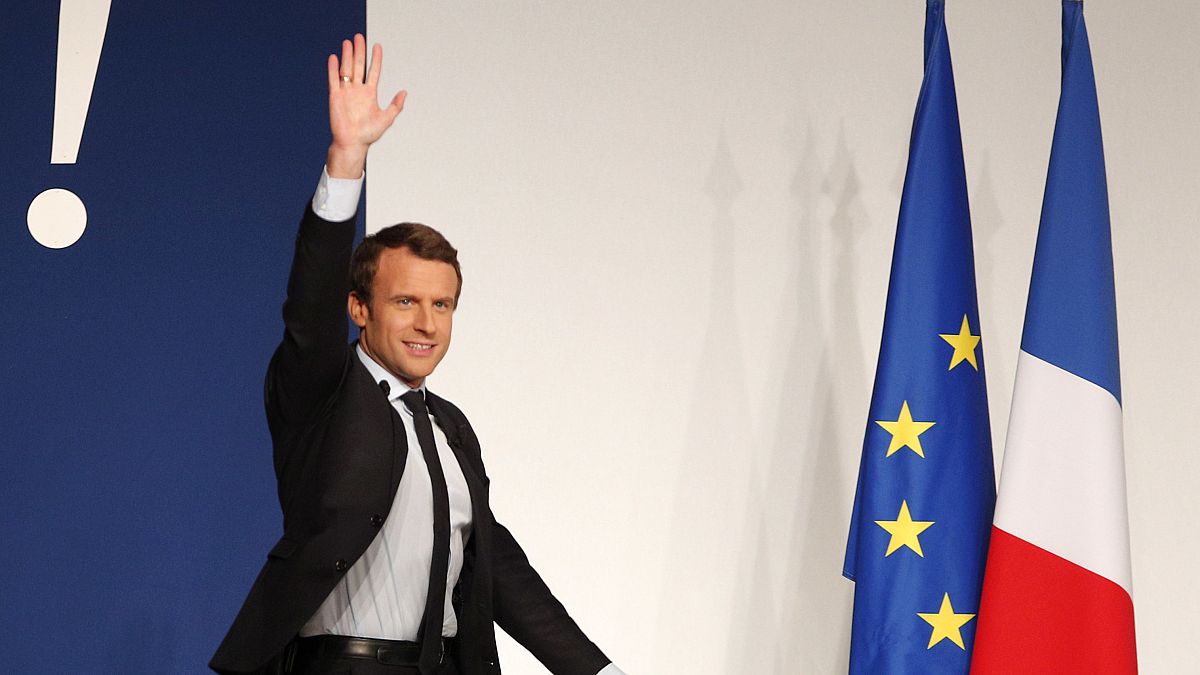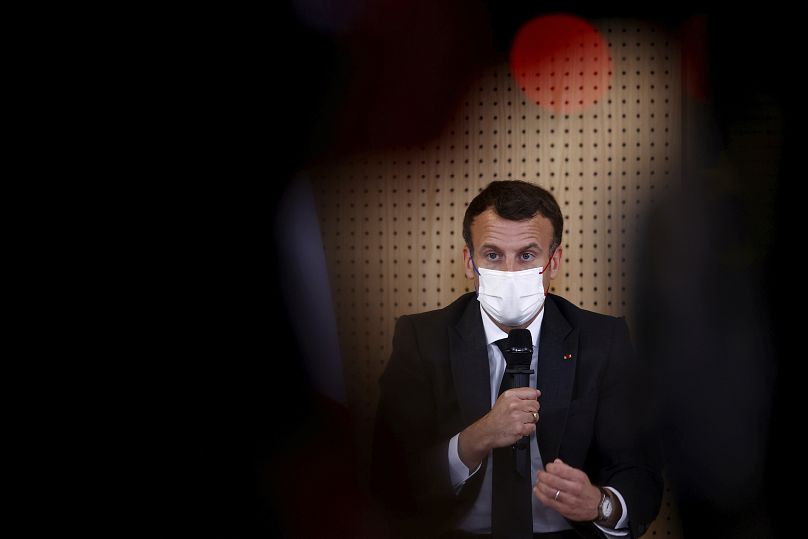Macron branded himself as someone who would overcome left-right cleavages but a year away from the presidential elections, some say his brand is still a mystery.
Four years after a former government minister's new movement helped him defeat a plethora of higher-profile candidates to become president of France, his political brand has remained something of a mystery.
Emmanuel Macron sold himself as both right and left politically and as someone who would fundamentally change a technocratic French government system.
A former economy minister in the Socialist Party, he garnered support from all over the political spectrum when he launched his movement “En Marche”. He explained to a classroom of children in 2017 that he would try to take from both the left and the right.
Now a year away from France’s upcoming presidential elections, his approval ratings have plummeted and some are torn on where he stands politically. Many say he has increasingly endorsed more right-leaning policies.
According to the most recent poll from IFOP, around 37% of French people approved of the president. It’s a far cry from the 62% approval rating he enjoyed after he was first elected.
Although higher than the approval ratings of both of his predecessors, since his election the country’s abstention rate has increased and his party has faced several electoral disappointments.
The far-right National Rally party, led by Marine Le Pen, came out ahead in the 2019 European elections in France. And in the 2020 municipal elections, Macron’s new party did not fare well against the right-wing Républicains nor the Greens.
Centrism or political neutrality?
Raphael Llorca, a researcher who published a book earlier this month about Macron’s political branding, said the French president had tried to remain politically “neutral”, something he argues has created disillusionment amongst French people.
“Neutral has become a kind of tactical composition where we take people from the right, we take from the left, we take from the centre, we take popular people and then all that together, it forms something neutral. But neutral is actually not at all an aggregate of contradictory things,” Llorca argues, referring to the appointment of both a right-wing interior minister and other centre-left ministers.
Macron has relied not on political ideology but rather on political branding to sell his platform, contributing to its convoluted and sometimes undefinable political leaning, some argue.
Macronism is “neither an ideology nor a clearly defined body of thought,” Llorca, who is also an expert at the Fondation Jean-Jaurès, said, but rather a way of “staging” or presenting political projects.
He argues that Macron’s use of symbols, colours, and appeasing political language all contribute to an effort to create a narrative rather than a political ideology.
A key example for Llorca is when Macron positioned himself against Donald Trump with the “Make Our Planet Great Again” phrase and campaign.
He says it was a “very clever way to position yourself as a hero of the global climate against Donald Trump.”
“But we realise that today, with a little hindsight, it is completely disconnected from the political system that he wanted to put in place. He has not been the ecological president at all,” Llorca said.
“La République en Marche is a lot of marketing,” said François-Michel Lambert, a member of parliament who quit the party in 2018 over Macron’s environmental policies.
He said the early and dramatic departure of revered environmentalist Nicolas Hulot from Macron’s government that year influenced his decision.
In another key moment from Lambert, after Macron promised to ban an insecticide known to be harmful to bees, a law voted by his party temporarily reinstated the product’s use.
A promise for change versus consolidation of power
Experts say one of the most remarkable aspects of Macron’s presidency has been a consolidation of power more exaggerated than in previous governments of the Fifth Republic.
“The French republic is an extremely hierarchical democracy with a relatively weak parliament and a very strong executive in which the president is a far stronger player than any other member of the executive,” said Douglas Webber, a professor of political science at INSEAD.
He says that under Macron the executive tilt has become even more exaggerated.
“It’s nothing new under the Fifth [Republic] but he’s taken it very very far,” explains Guillaume Gourgues, a senior lecturer in political science at the University of Lyon 2.
“We’re seeing that the legislative agenda and the reforms are being dictated unilaterally by the Elysée," something that has become more evident, he says, during the pandemic.
“There is a black box which decides and if you are not in it, you are not able to participate in the collective construction of a project,” lamented Lambert, who called it “hyper monarchical” and a functioning of a previous political world that was now "extinct".
One of the key examples of this, for many experts, has been the French president’s handling of the COVID-19 crisis.
Macron enjoyed higher approval ratings at the beginning of the crisis, stating that the country was at war with the virus.
"When we are at war, we must make a kind of sacred union for the country and any criticism is counterproductive because it...slows down the smooth running of the government," Llorca explained.
Macron's first lockdown restrictions, based on a scientific advisory committee, also significantly reduced COVID-19 infections and allowed the country to fully reopen by summer.
That reopening is now blamed for fuelling the second and third virus waves.
Now, Macron’s move to go against the advice of his scientific advisers by not instituting a lockdown in early 2021 could have repercussions as the country faces overflowing hospitals and intensive care admissions.
“I think there's a sense that people think that Macron has sort of lost his sense of judgement. And I think he probably made a critical error at the end of January in not deciding when to actually impose a proper lockdown in France,” added Webber.
Meanwhile, his ministers have defended an “epidemiologist” president, characterising him throughout French media as someone who reads every study published on coronavirus. It’s something that critics have characterised as a “staging” of the head of state.
“An autocrat turned megalomaniac, drunk with power and praise from his courtiers, Emmanuel Macron is creating a personality cult: he knows everything, he foresees everything, he decides everything,” tweeted Bastien Lachaud, a far-left leaning member of France’s parliament.
A shift to the right?
Macron’s nomination of interior minister Gérard Darmanin, who has taken a harder stance on Islam and policing, has also lead to more speculation that the French president’s party has positioned itself to the right on security issues.
Mass protests broke out in France late last year over an article in a security law that forbids the filming of police with the intention of damaging their integrity. The law's language has since been slightly toned down and passed parliament.
Then in a stunning debate against Le Pen, Macron’s interior minister said the far-right candidate was too soft on certain questions in relation to security and Islamism, prompting her to reply: “Mr Darmanin, I confirm that I am not attacking Islam which is a religion like others and, because I’m attached to our French values, I hope to allow them to continue to fully organise and practice.
Webber says calling Le Pen soft on immigration was “remarkable language” from a government that has attempted to sell itself as centrist.
“I think Darmanin was put in his position by Macron and by the new prime minister basically to undercut support for Marine Le Pen and for the Rassemblement National and you know occasionally coming out actually sounding more ‘extreme’ or ‘tougher’ on issues of internal security and immigration than Marine Le Pen herself,” Webber said.
Right-leaning Républicains parliamentarian Eric Ciotti said in a recent interview with French newspaper Le Figaro that Marine Le Pen was becoming more centrist and Emmanuel Macron more right-wing, for instance.
But in the face of an editorial in left-leaning magazine Libération, in which left-wing voters said they would not support Macron in next year’s election, several government ministers continued to describe themselves as “left wing”.
Labour minister Elisabeth Borne said in February: “I am a woman of the left. Social justice and equal opportunities are the battles of my life. And in Emmanuel Macron, I found their best defender.”
“So I say it to the voters of the left: look at what we are doing, do not give up in front of the FN (National Rally),” she added.
Others argue he's always leaned more centre-right with some of his first moves in office including cutting the wealth tax and reducing housing aid by €5 a month, policies viewed as right-leaning.
“There is one area where Macron has never really made a secret of his political orientation, which is the subject of macroeconomic policies,” Gourgues added.
Nicolas Véron, an economist at the Peterson Institute for International Economics and Bruegel, contended however that Macron’s economic policies constituted a “modernisation of antiquated french party framework” and were in line with international economic thinking.
Macron's recent increase in state intervention during the COVID-19 crisis is also in line with International Monetary Fund advice to spend more during the coronavirus pandemic, he said.
His economic policies are “not highly ideological from the point of view of an economist. They’re very no-nonsense, pragmatic strategies by and large,” Véron said.
What sets Macron apart from others?
Macron’s main difference from opposition parties, experts say, is that he remains steadfastly pro-European.
In what’s likely to be good timing for Macron, France will hold the European Council presidency during the first six months of 2022, including in April when the presidential election will happen.
A big success for Macron in 2020 was the European stimulus plan, championed by him and German Chancellor Angela Merkel.
The plan ended up introducing debt sharing for countries amid the coronavirus crisis, a step previously opposed by European leaders that have been called more “frugal”.
“One of the things that distinguishes Macron from most of his rivals and the other parties is very, very outspoken and very emphatic, pro-European,” Webber said, adding that it’s an issue that has split opposition parties while uniting Macron’s political base.
Some have argued that Macron’s policies are being adapted to a country that is more “right-leaning” as well, with his likely opponent in the second round of presidential elections being Marine Le Pen.
It remains to be seen, however, if that calculation will pay off in 2022.
Every weekday at 1900 CEST, Uncovering Europe brings you a European story that goes beyond the headlines. Download the Euronews app to get an alert for this and other breaking news. It's available on Apple and Android devices.

